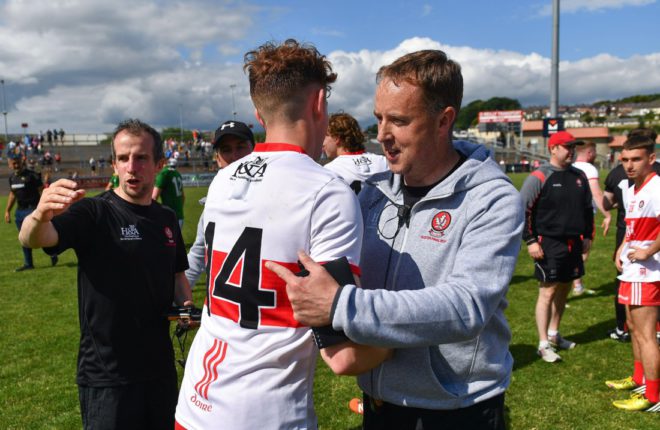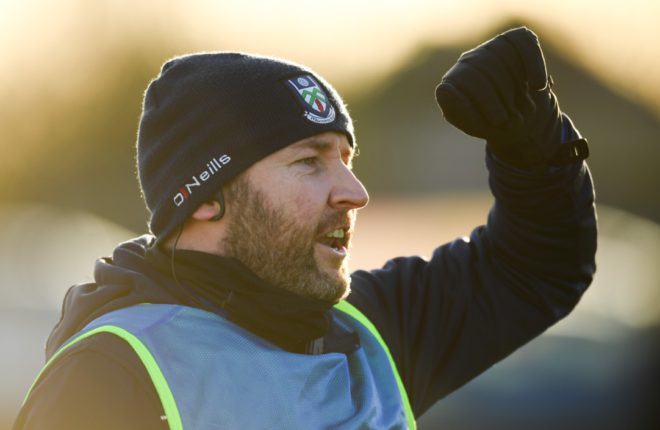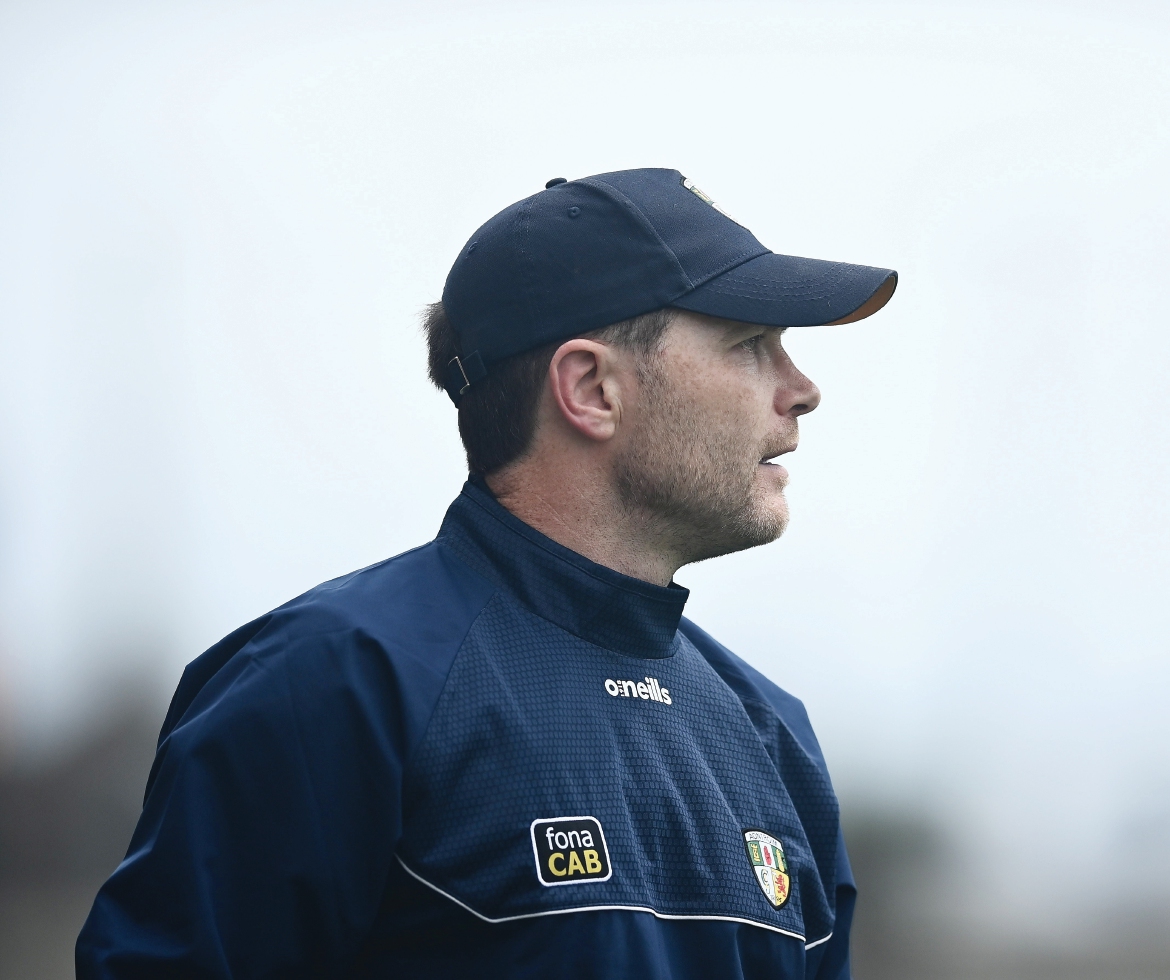THERE has been much debate in the GAA over age groups, fixtures, burnout and changes. Michael McMullan got the views of coaches on their key issues.
Enda McGinley
FORMER Tyrone star and Antrim manager Enda McGinley managed his club Errigal Ciaran to back-to-back minor championships when the age grade was still u-18.
He believes the new u-17 cut off point for underage was made to suit fixture planners to avoid clashes between minor and senior football, but the loss of the bridging year is detrimental to player development.
“There are lads 16 and a half and 17 who no longer have any underage and only have senior football,” he said, explaining that 16 of the current Errigal minor team are overage next season and into the world of adult football.
“I have a lad at home, he is 11 and he has five years of underage football left…he is a child,” he said of his son.
“Anyone with any honesty knows that an u-19 competition in any county is going to be a token competition, it’s not good enough in those lads’ key years.”
McGinley sees absolutely no benefit of moving the minor grade to u-17, but would be very keen to hear the views of those in favour of it.
As a two-year county minor himself and as a physiotherapist, he is well-placed to delve into the needs of someone walking into a senior environment.
Without the extra year of underage, the former Antrim boss feels the senior game is “so far beyond reach” of newcomers.
“Drop out is a much bigger concern for clubs than burn out,” he said, clarifying that burnout only affects the elite players.
McGinley points out two contrasting types of player coming out of underage with an eye on a starting jersey for the seniors.
“The person who is very keen and really wants to make senior at 17, but realises, athletically, they are off it,” McGinley points out
“They are going to try and supercharge their development, which is not what they want. That has to be patiently developed over three or four years.
“Tying to short circuit that and go overtime in the gym or take products…you don’t want lads to short circuit that or feel they are playing catch-up at 17 years of age.”
The other bracket of players will see themselves as three or four years away from senior football, with reserve football not being an adequate pathway in most counties.
“With all the distractions at that age, they’ll take a year or two out or they will drop it completely, so we will lose a large portion of them as well.”
The alternative is a player focused on his underage team – at u-18 level – and dipping his toe into some reserve or senior football to break the ice for the following year.
As a county minor, he recalls his study calendar, having his potential 23 training sessions and seven games mapped out across the 28 days of February.
It required planning and selecting which activities were a priority, something that he believes prepares players who later have to mix final year studies with inter-county senior, an environment he managed with Antrim in recent seasons.
“If anything, I would want to hold on to players for longer. I’d move it to school year, to get rid of the bad birthdays.
“I would hold on to them for as long as possible and give them as big a stepping stone as possible to senior grade.
“We are suggesting no competitive football until u-14, but it’s is okay to put 16 and 17 year old lads in their last year of competition, and that doesn’t add up for me.”
Of the 16 players moving out of underage football next year in Errigal Ciaran, McGinley feels it’s an age when the discipline of team sport is needed more than ever.
“We are kicking them out,” he said. “It appears to be of great convenience to fixture makers.”
Explaining the effect of burnout, McGinley said it only affects the “top one per cent” playing school, club minor, club senior and county minor. It requires a balance, rather than turning off the tap on the majority of players.
“The elite players were always doing okay, that’s why they were elite. They were thriving and will continue to thrive,” he said, clutching at reasons for the change.
“It’s the sheer disconnect. For me, I always try to get my head around the other side of the argument to weigh things up.
“It is a terrible idea, it’s damaging to our game, our players and our clubs. Why can the GAA not see it? Deep down I feel they can, but are so reluctant to take a backward step. They seem unable to do that.”

MOVING UP…Derry’s All-Ireland winning manager Martin Boyle will take over the u-20 team next season
Martin Boyle
AS a former Derry minor manager, moving to u-20 next season, Boyle sees the “massive groundswell” of opinion calling for a move back to u-18 and u-21.
He feels u-18 is the best age group for the final year of development but there needs to be a degree of balance around the entire topic. The GAA needs to cast the net wide to find the final outcome, one that doesn’t keep changing and allows various teams time to prepare adequately.
“There is no easy solution to everything,” Boyle said. “The one thing the GAA need to do is to decide what they are doing and seek opinion at grassroots level.”
“I would be an advocate of u-18 because, particularly at county level. I feel the level of football u-17s are exposed to at county level is definitely too much for them with the environment they are put into.”
Boyle feels the GAA have basically admitted that themselves, with Ulster the only province to pair minor and senior finals. There was also the case where Derry, Galway, Kerry and Mayo had both minor and senior games on the same weekend during the summer, and pairing minor and senior games would’ve avoided fixture problems.
When Derry won the 2020 Minor All-Ireland, it spilled over into the following July due to the Covid lockdown with players u-18 by the time the competition was in the melting pot.
“The difference was in the maturity,” said Boyle, something echoed by Enda McGinley. “It was a shock and a stark difference. As a u-18, they were ready but the u17s weren’t.”
Boyle will take over from Paddy Bradley as u-20 manager next season, with the same management moving up with him from the minor grade. He doesn’t buy the idea of a return for the u-21 grade.
“I would like someone to tell me how moving it back to u-21 is going to fix the problem,” he said, referring to the scenario of u-20 players being part of senior squads.
“Whatever chance there is of getting lads to play at u-20, there is even less chance at u-21.”
He uses the example of Kerry where their five in-a-row of All-Ireland Minor titles didn’t produce a single final appearance at u-20u-21 level. Like Kerry, a host of the Derry All-Ireland winning minor team graduated straight to the senior panel.
Next season will only prove more difficult with more games at senior level with the new inter-county structures.
“The problems that exist at u-20 level will only be magnified when you go to county u-21,” Boyle added.
With his finger on the pulse with teams in his club in Ballinascreen, Boyle stresses the move to u-17 hasn’t been the disaster everyone is making it out to be.
“I do think it (the dropout) is exaggerated,” he said. “I can only speak from my own club…yes, there have been some players who have dropped out.
“But it has surprised me the amount of lads that are (still) there. We have a competitive reserve team, they are at senior training all the time and next year we will be able a Thirds’ team. If I had a choice, I would definitely go back to the even numbers at underage, but the problems people are giving out about suit certain narratives.”
Having scoured the Derry U-19 Championship to check the players at his disposal for county level next year, Boyle said it was a “decent” competition with an abundance of good games played at the right time of the year.
“It was a championship that most of the clubs backed. I know some of them didn’t, for whatever reason,” he added.
“The even numbers (u-14, u-16 and u-18) gives players another year, but if we are staying at odd numbers work has to be done at getting buy in from everybody to get a fully functional u-19 league and championship.”
With county level set to move to u-19 as the only competitive age before senior, Boyle calls for careful planning with school, club and university action to be factored in.
“It is county football and you need proper preparation,” he said of an u-19 county scene. “The calendar has to be devised to fit accordingly so players have time to give the best of themselves.”

NEW SCHOOL…Mark Counihan feels a more streamlined MacRory Cup would help fixture planning
Mark Counihan
FORMER Monaghan minor manager Mark Counihan found himself taking calls from a mixture of players and their parents for advice on how to bridge the gap to senior after u-17.
“What was brilliant about u-17 was that there was no added pressure of playing senior football,” he said about his time in the Farney post.
“That was the only big bonus, but it would be easily rectified by not allowing an 18 year old to play senior club until their county minor season is over.”
He could only comment on his own county, but it would alleviate the pressure on players in a key development age.
“I don’t think any team is that dependent on an 18 year old, you don’t miss what you don’t have. If they weren’t allowed to play, it wouldn’t be the end of the world, but I can only speak for Monaghan,” he said.
At club level, getting the underage season finished by the end of summer would allow players to blend into senior setups ahead of their first year of adult football.
It’s the gap from u-17 to senior that has proved the most difficult to bridge. And it isn’t not even a physical one.
“A young lad can struggle to fit in at senior level,” he said. “The u-19s has been a shambles with unfulfilled fixtures and it hasn’t worked out.
“With a club hat on, for the development of players, going back to u-18 would be a massively positive step. It keeps boys in the system a year longer. Physically, mentally and emotionally they are better off going in after that extra year than they are at 17.
“Socially they are finding it hard to fit in. It is a world apart from going to school versus a player who has been working for 10 years and has kids,” he said of the range of individuals in a senior dressing room.
Counihan, a teacher in St Macartan’s, Monaghan, also feels the fixture calendar needs smoothed out to help players find a better balance.
“The MacRory competition needs to be wheeled back; it dominates the school calendar for too long in the year,” he said.
“There is no reason why you couldn’t have the MacRory wrapped up before the end of January,
“It would free up the u-20 players a bit more. U-20 management teams, they have so many things to work around – MacRory teams, Fresher teams and clubs that are going to advance into Ulster.”
He also feels players are joining county senior panels too quickly, using Tyrone as an example of a county allowing their budding stars to find their feet.
“I would be strong in my belief that u-20 players should fulfil their own age group before they move into senior level.
“Someone on a senior panel could have u-20, club and college, they seem to break down a lot quicker.
“Players getting fast tracked have been getting really bad injures and were out for a significant period of time.”
Willie McAteer
FANAD native Willie McAteer is involved with underage in Derry club Castledawson, where he now lives, while also coaching the younger teams in St Patrick’s, Maghera.
His biggest bugbear with the changes is the lack of communication filtering down to those at the coalface.
“I can see pros and cons in what a lot of the people are saying, but the one thing I would love to see them do when they do it is communicate why they are doing it,” he said, using the example of messages on social media asking why age groups are changing.
“Nobody knows why. The people on the ground and haven’t a clue of the thought process of why they are moving it,” he said, comparing it to a coaching session anywhere in the country.
“If you are doing a drill at football training, you explain the reason for doing it or else you are wasting your time doing the drill.”
He feels the key motivation for the changes is to decouple senior and underage football, but insists the few minors are ready to make the step anyway.
“Nobody’s issue was the u-17,” he said. “It’s what happens when you got out of u-17. Very few of them, with the way strength and conditioning has gone, would be in and around a good senior team.
“Young (Ruairi) Ó Mianáin in Sleacht Néill is an exception there, but there are very few. Dan Higgins wasn’t in (Magherafelt senior team) until he was 19. They (the majority of u-18s) are not even ready to play senior football or even close.”
Having played for a rural club in Donegal, McAteer says clubs shouldn’t rely on 1 group of players.
“You have 15 years from 19 to 34,” he points out. “If you can’t bring through one player a year over a 15-year period…it is not the boys in their last year of u-18 that is the problem, it is everything you have done for the 15 years before that.”
Clubs must find a way of fielding a senior team without underage as the overlap, as it’s holding back a vibrant underage scene.
“Let’s it go back to u-18s and let u-18 be a good competition again. No more holding it back,…you are holding back a very big percentage for a small percentage of elite players who are probably playing country underage. What other way is there around it? You want your minor (campaign) to go ahead, but it is being held back because one lad is playing senior football, it is holding back the whole thing.”
He suggest that inter-county moving to u-19 wouldn’t be a bad move, with u-16 as the earliest age for any form of development squad. Before that, clubs and schools can get players on the ladder.
“Fellas just want to play football. It will be in two or three years’ time when boys come through the other side.
“The proof will be in the pudding then (if the age grade made a difference).”
Receive quality journalism wherever you are, on any device. Keep up to date from the comfort of your own home with a digital subscription.
Any time | Any place | Anywhere












